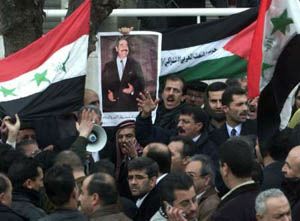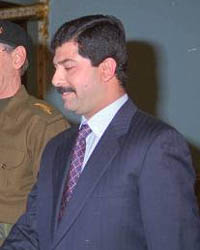 |
| Vol. 3 No. 2 | Table of Contents MEIB Main Page | February 2001 |
| Laurie Mylroie has taught at Harvard University and the U.S. Naval War College. Presently, she is the publisher of Iraq News and the Vice-President of "Information for Democracy." She is the author of Study of Revenge: Saddam Hussein's Unfinished War Against America. |
 |
| A pro-Iraqi demonstration in Jordan on February 17 [Reuters] |
Few expect the Arab states to single-handedly meet the kind of challenge posed by Iraq. After Iraq invaded Kuwait in August 1990, Baghdad's allies, including Jordan's King Hussein, argued against any hurried U.S. intervention. Their position was that sufficient time should be allowed to develop an "Arab solution" to the crisis. The U.S. rejected that advice then, believing that a consensual Arab position would result in an Arab compromise with Baghdad. A similar situation exists today, only the previous American administration deliberately downplayed the Iraqi challenge.
Iraq's rehabilitation among the Arabs is occurring not because Saddam Hussein has adopted a conciliatory posture, but in spite of his continuing belligerence, or, perhaps, in some respects, because of it.
Iraq's Intensified Bellicosity toward Kuwait and Saudi Arabia
A Kuwaiti professor of political science once advised this author that there was something very important that Americans had to understand about the mentality of the Iraqi leadership.1 He then proceeded to relate the following story.
In the late 1980's, in the latter stages of the Iran-Iraq war, a delegation of the Arab Political Science Association met in Baghdad with Tariq Aziz. The professors asked Aziz why Iraq was attacking tankers carrying oil from Iran, even when the tankers were from countries friendly to Iraq. Aziz replied that Iraq wanted more international pressure on Iran to end the war and the way to get people to do what you want is to hurt them.
Iraq's Belligerence: Phase I
From time to time since the Gulf War, Iraq has singled out Saudi Arabia and Kuwait for abuse. But Baghdad began a particularly sustained campaign of intensified bellicosity toward the two Gulf states early last August, on roughly the tenth anniversary of the Iraqi invasion. On August 3, Iraq Radio broadcast a cable from Qusay, Saddam's younger son, to his father, hailing the invasion:
We recall with pride and esteem the second of August, the great Call Day . . . when the splendid men of the Republican Guard and our brave Army charged in a powerful push to topple the center of corruption and treason represented by the House of Al-Sabah. The entire Kuwaiti territory was liberated and wrested from the hands of that backward and abhorrent regime, and just punishment was meted out to them.
 |
| Qusay Hussein |
Five days later, Saddam delivered a speech marking the twelfth anniversary of the cease-fire to the Iran-Iraq war. He harshly attacked Kuwait and Saudi Arabia. His focus was their support for U.S. and U.K. enforcement of the southern no-fly zone. Saddam asserted,
Is it not shame and disgrace on those who harbor shame and disgrace that the planes of the aggressors take off from their land and territorial waters to bomb the citadel of the Arabs and the cradle of Abraham (peace be upon him) and to destroy the property of the Iraqis and kill them all: women, men, and children? Is there any other way than this to describe treachery and disgrace?3
Baghdad can, to some extent, determine when and where the allied planes enforcing the no-fly zones attack Iraq, at least under the rules of engagement that prevailed under the Clinton administration. Iraq had only to fire at the aircraft and they would strike back, largely in a tit-for-tat response. If Iraq wanted to cause civilian casualties, it had only to place its air-defense guns in the midst of civilians.
Iraqi provocations and allied strikes accompanied Baghdad's verbal campaign against Kuwait and Saudi Arabia. After a six-week lull in coalition air strikes, U.S. and British planes hit targets in southern Iraq on the nights of August 11 and 12. The first strike hit a warehouse used by the Ministry of Housing and Construction. One civilian was killed and eleven others wounded.4 The strike the next night hit a railway station, according to the Iraqis.
The Iraqi cabinet then met to condemn the strikes that Baghdad had provoked. It asserted, "The aircraft which kill Iraqi children, men, and women and destroy their property on a daily basis are financed and supported by the Saudi regime, which coordinates with the United States, with a Zionist blessing, to keep the embargo on Iraq for the longest possible period."5
The assaults on Kuwait and Saudi Arabia by high-ranking Iraqi officials were accompanied by an ongoing campaign in Iraq's government-controlled press. For example, Babil published an article directed against the Kuwaiti leadership entitled, "After 10 Years, Do They Need an Extra Lesson?" It began:
We agree completely with a Kuwaiti midget, who said that the rulers in Kuwait have failed to learn their lesson. Overindulging in their treason as they are, the rulers of Kuwait failed to realize that every day of suffering under the embargo makes the Iraqis grow more spiteful against those who stand behind the perpetuation of the embargo . . . If they have eyes to see and brains to perceive, the rulers of Kuwait must keep in their heads that we never forget those who hurt us."6
Many such articles followed.7 Iraq's language was consistently foul and vicious. And the attacks were accompanied by strong statements denouncing the Arab League and its Egyptian Secretary General, Ismat Abd-al-Majid, who had issued some statements mildly rebuking Iraq.8
As Baghdad's campaign continued, the U.S. said and did nothing. The Iraqi assaults even contained scarcely veiled threats of terrorism and Iraqi-inspired unrest. As Al-Iraq wrote, "The continued political stringency and tendency to nourish aggression have turned the community into social groups living in a booby-trapped political scene. Once the moment comes for domestic explosion, these groups will blow themselves up and pose the gravest risk to the Saudi and Kuwaiti entities."9
Iraq even went so far as to evoke the period just before it invaded Kuwait. In mid-September, Iraq's Oil Minister charged that Kuwait was stealing Iraqi oil. He asserted, "Over the past few years, Kuwaiti rulers have conducted oil drilling activities in the shared areas aiming to drain the oil wells there. . . Iraq is following this issue and will take the necessary measures to insure the rights of Iraq and the Arab nation."10 As a senior Kuwaiti official remarked, "The latest Iraqi claims and threats sound exactly like the language used in July prior to the invasion."11 Yet on the very same day, when asked about the efficacy of U.S. policy toward Saddam, Secretary of State Madeleine Albright replied, "He is in his box. . . [W]e have kept him contained."12
Baghdad's next escalation was to place hundreds of people on its border with Kuwait. It had also done that in October 1994, when Iraqi forces lunged at Kuwait, or seemed to do so.13 In early October 2000, several hundred people appeared on the Iraqi side of the Kuwait border, demanding entry into Kuwait. Baghdad maintained they were "bidoon," stateless Arabs who were formerly resident in Kuwait. Kuwait maintained that whoever they were, Iraqi intelligence had organized them and bussed them to the border. The protesters camped on the border for five days, before suddenly announcing, on October 7, that their demonstration was over. They were leaving, they maintained, because "developments in the Palestinian cause" brought about a need "to focus all efforts against the Zionist enemy."14
Indeed, Iraq proceeded to do exactly that. Baghdad ceased to attack Kuwait and Saudi Arabia and turned its attention to the Al-Aqsa intifadah, which had begun a week earlier. Iraq took an extremist position, calling for maximal Palestinian violence against Israel. It did so because Saddam believes Israel should be destroyed and because that posture serves Iraqi interests. Expressing this radical position embarrasses other Arab regimes and increases Baghdad's leverage over them.15
Thus, as the first phase of Iraq's campaign against Kuwait and Saudi Arabia ended with the onset of the Palestinian intifadah, Iraq had paid no price for its belligerency. On the contrary, the renewal of the Palestinian violence allowed Iraq to attend its first Arab summit since the Gulf War, held October 21 in Cairo.
Subsequently, Egypt took the symbolically significant step of upgrading its representation in Baghdad from an interest section. On November 7, Cairo reopened its embassy at the charge d'affairs level. One source suggested that Egypt was rewarding Baghdad for its relatively restrained stance at the Arab summit.16 Whatever Cairo's motive, it was probably no coincidence that just six days later, Saudi Arabia and Egypt announced that they had signed an agreement whereby the Saudi Fund for Development was to extend $100 million in concessionary loans to projects in Egypt.17
Even more markedly, Syria had been drawing closer to Iraq, particularly after the death of Hafez Assad in June. In November, Iraq began pumping oil to Syria, generating an additional $ 2 million per day for the Iraqi regime.18 With both Cairo and Damascus increasingly dealing with Baghdad, Saudi Arabia and Kuwait faced serious difficulties in maintaining Iraq's isolation as the year 2000 drew to a close.
Iraq's Belligerence: Phase II
 |
| Uday Hussein |
These developments were accompanied by what looked to become a second Iraqi campaign against Kuwait and Saudi Arabia, similar to the first. On January 15, Babil published a "recommendation" by Saddam's older son, Uday, to Iraq's National Assembly, advising that it should change the map of Iraq on its emblem to include Kuwait.
As would be expected, Kuwait protested very strongly. But that only set the stage for more Iraqi abuse. Babil wrote, "Kuwait's rulers remind us of those who search garbage cans in the hope of finding something useful, but only manage to dirty their hands." 21 Al-Iraq wrote, "The people of Iraq are about neither to forget nor to forgive what these rulers had done to them. These rulers have made Iraqi families run the gauntlet of a hideous blockade for 10-plus years. Woe to America's slaves."22
The Arab League released a statement noting that Iraq's "statements undermine efforts exerted to achieve Arab reconciliation."23 Some other Arab statements were issued in support of Kuwait. But only Saudi Arabia strongly backed the sheikhdom.
In fact, Iraqi Vice-President Taha Yasin Ramadan arrived in Egypt the day after Baghdad initiated the new round of belligerence by publishing Uday's comments. Ramadan was the highest-ranking Iraqi official to visit Cairo on a bilateral visit since the Gulf War. When asked about Uday's remark, Ramadan replied that it was merely Uday's personal view and that "ninety-nine percent of the [Iraqi] people are convinced of this, but the political leadership has another point of view"--scarcely an answer intended to calm the situation.24
While in Cairo, Ramadan signed a "free trade agreement" with Egypt. That did not indicate an Egyptian commitment to circumvent sanctions. Rather, it meant that Egyptian products exported to Iraq would no longer be subject to tariffs. Yet the agreement was politically significant and testified to the growing trade between Egypt and Iraq. A week later Ramadan visited Syria and signed a similar agreement.
In late January, Egyptian president Hosni Mubarak visited Saudi Arabia and then visited Kuwait in early February. Arab reports claimed that Mubarak was attempting to mediate between Iraq and those two countries. But what could there possibly be to mediate? The Iraqi press went so far as to advise Kuwait to remove its "artificial" border with Iraq, following Mubarak's visit there.25 An Arab diplomat suggested to Middle East Intelligence Bulletin that perhaps Mubarak was, in reality, trying to strengthen his position with the new U.S. administration, so that Egypt might receive something in exchange for dropping its advocacy on Iraq's behalf.
Whatever Iraq was planning in regard to its renewed campaign against Saudi Arabia and Kuwait, the large-scale February 16 allied strike on Iraqi air defense sites in and around Baghdad almost certainly came as a major surprise to the Iraqi leadership. Not only did it significantly damage Iraq's air defense capabilities, but it also served as a strong signal that the new U.S. administration would not be turning a blind eye to Baghdad's challenges.
Indeed, there are indications that a more general shift in U.S. policy is in the making. On the day of the strike, the State Department asked Ahmad Chalabi, a member of the leadership council of the Iraqi National Congress, to come in for a meeting with Ned Walker, Assistant Secretary of State for Near Eastern Affairs. Walker informed Chalabi that the previous restraints on working with the INC were gone. Chalabi would be dealing with new people and the INC should move ahead as quickly as possible to implement the plans that had already been approved, for information-gathering inside Iraq and radio and television broadcasting into the country.
Conclusion
It is not yet clear what the objective of the new administration's Iraq policy will be--whether Saddam's ouster will be a prominent part of that policy, or a minor component of a policy whose focus will be on maintaining sanctions and getting weapons inspectors back into Iraq. However, it is clear that the Bush administration will deal far more vigorously with Baghdad than the previous administration.
Yet, whether it will be able to mobilize regional support for its policy remains to be seen. Arab leaders recognize Saddam for the danger he is. Their willingness to back the U.S. will depend, to a significant degree, on the extent they believe that the U.S. will protect them against the worst that Saddam might do. That Arab populations have come to sympathize with the suffering of the Iraqi population and attribute its suffering to the decade-long sanctions makes that task more difficult. It is also made more difficult by the ongoing Palestinian-Israeli violence, even as there is no easy or quick remedy for that violence.
The Jerusalem Post recently opined, "What is at stake in Iraq is not just Saddam's fate, but whether a rogue state can terrorize its people, threaten its neighbors, defy binding UN sanctions, and get away with it. The struggle over Iraq is about the kind of world we want to live in."26 Or, put another way, it is Saddam's view, as explained above, that "people do want you want, went you hurt them." The question is whether that outlook will triumph or whether a more decent vision will prevail.
Notes
1 Ghanim al-Najjar, to author, London, 23 February 1996.
2 Indeed, it can be well argued that the decision at the policy level to downplay the Iraqi threat affected the analysis of those at lower levels in the U.S. bureaucracies. When this first statement appeared, a U.S. government analyst suggested to this author that the most likely explanation for the cable was internal Iraqi politics: Saddam was promoting Qusay as his successor.
3 Iraq Television, 8 August 2000.
4 Reuters, 12 August 2000.
5 Iraq Radio, 13 August 2000.
6 Abd-al-Razzaq Muhammad al-Dulaymi, "After 10 Years, Do They Need an Extra Lesson?" Babil (Baghdad), 7 August 2000.
7 To cite a few: Abd-al-Razzaq al-Hashimi, "Media and Truth," Babil (Baghdad), 13 August 2000; Dr. Qays Muhammad Nasi, "Money's Diplomacy," Babil (Baghdad), 15 August 2000; Nu'man Mahmud Sirt, "The Saudi and Kuwaiti Regime and Their Crime of Supporting Aggression," Al-Jumhuriyah (Baghdad), 14 August 2000.
8 Al-Sharq Al-Awsat (London), 20 August 2000.
9 Dr. Aziz Ali, "The Gulf People: No to Saudi Custodianship and Kuwaiti Arrogance," Al-Iraq (Baghdad), 7 September 2000.
10 Iraq Radio, 14 September 2000.
11 Reuters, 14 September 2000.
12 Remarks by Secretary of State Madeleine K. Albright at Press Availability, U.S. Department of State, Office of the Spokesman, New York, 14 September 2000.
13 It would seem that the real purpose of the seeming Iraqi attempt to re-invade Kuwait in October 1994, was actually to create a crisis which would have the effect of increasing the pressure on UNSCOM to issue a positive report on Iraq's weapons. See Jim Hoagland, "Saddam Won't Just Fight the Same War Over Again," Washington Post, 12 October 1994, and Laurie Mylroie, Study of Revenge: Saddam Hussein's Unfinished War Against America (Washington DC: American Enterprise Institute, 2000), p. 129.
14 Agence France Press, 7 October 2000.
15 See Laurie Mylroie, "Iraq and the Palestinian Conflict," Middle East Intelligence Bulletin, December 2000.
16 Al-Sharq Al-Awsat (London), 8 November 2000.
17 MENA, 13 November 2000.
18 Los Angeles Times, 23 January 2001.
19 See Iraq: Intelligence Briefs, Middle East Intelligence Bulletin, January 2001.
20 Washington Post, 19 February 2001.
21 Dr. Abd-al-Razzaq Muhammad al-Dulaymi, "Those Indulging in Delusions," Babil (Baghdad), 22 January 2001.
22 Editorial, "We Won't Forget, We Won't Forgive," Al-Iraq (Baghdad), 26 January, 2001.
23 MENA, 18 January 2001.
24 Reuters, 17 January 2001.
25 Dr. Talib al-Dulaymi, "Will the Rulers of Kuwait Do It?," Al-Jumhuriya (Baghdad), 7 February 2001.
26 Editorial, "The Iraq Litmus Test," The Jerusalem Post, 19 February 2001.